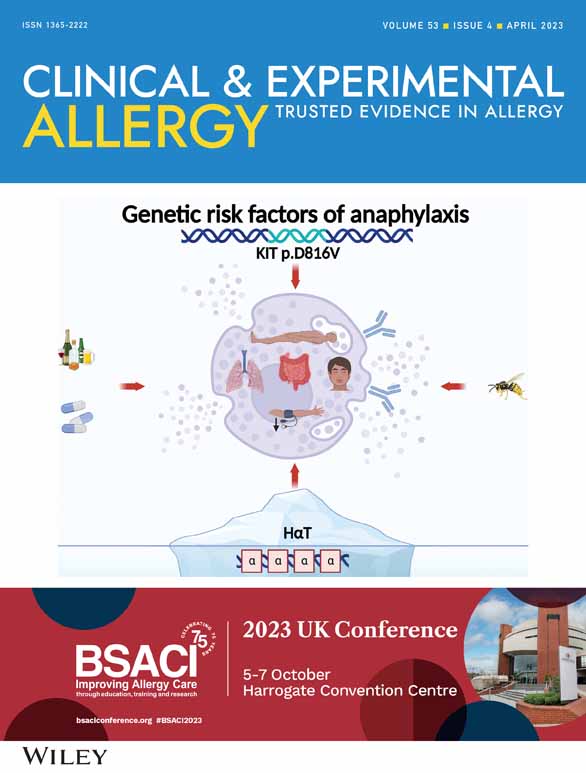Efficacy of tezepelumab in patients with evidence of severe allergic asthma: Results from the phase 3 NAVIGATOR study
Abstract
Background
Allergic asthma is the most common phenotype among patients with severe asthma. In the phase 3 NAVIGATOR study (NCT03347279), tezepelumab significantly reduced the annualized asthma exacerbation rate (AAER) versus placebo in patients with severe, uncontrolled asthma. This exploratory analysis evaluated the efficacy of tezepelumab in NAVIGATOR participants with evidence of severe allergic asthma.
Methods
Patients (12–80 years old) receiving medium- or high-dose inhaled corticosteroids and ≥ 1 additional controller medication, with or without oral corticosteroids, were randomized to tezepelumab 210 mg or placebo subcutaneously every 4 weeks for 52 weeks in NAVIGATOR. In this analysis, the AAER, forced expiratory volume in 1 second (FEV1), patient-reported outcomes (PROs), and type 2 biomarker levels were evaluated in patients grouped by sensitivity to perennial aeroallergens, confirmed symptomatic allergy, and eligibility for omalizumab treatment according to the United States (OMA-US) and the European Union (OMA-EU) prescribing information, including subgroups according to baseline blood eosinophil counts and fractional exhaled nitric oxide (FeNO) levels.
Results
Of 1059 patients who received treatment in NAVIGATOR, 680 (64%) had perennial aeroallergen sensitivity and 318 (30%) had confirmed symptomatic allergy; 379 (36%) and 359 (34%) patients were OMA-US- and OMA-EU-eligible, respectively. Tezepelumab reduced the AAER over 52 weeks versus placebo by 58% (95% confidence interval [CI]: 47–67) to 68% (95% CI: 55–77) across these subgroups. Among omalizumab-eligible patients, AAERs were reduced in patients across baseline blood eosinophil counts and FeNO levels. Tezepelumab improved FEV1 and PROs, and reduced type 2 biomarkers, versus placebo in patients with and without perennial allergy.
Conclusions
Tezepelumab was efficacious in patients with severe, uncontrolled asthma with evidence of allergic inflammation, defined by multiple clinically relevant definitions. These findings further support the benefits of tezepelumab in a broad population of patients with severe asthma, including those with severe allergic asthma.
CONFLICT OF INTEREST
Jonathan Corren has received grants and personal fees from AstraZeneca, Genentech, and Vectura; and has received grants from Optinose, Sanofi, and Teva Pharmaceuticals. Andrew Menzies-Gow has attended advisory board meetings for AstraZeneca, GlaxoSmithKline, Novartis, Sanofi, and Teva Pharmaceuticals; has received speaker fees from AstraZeneca, Novartis, Sanofi, and Teva Pharmaceuticals; has participated in research with AstraZeneca, for which his institution was remunerated; has attended international conferences with Teva Pharmaceuticals; and has consultancy agreements with AstraZeneca and Sanofi. Christopher S Ambrose, Janet M Griffiths, Åsa Hellqvist, and Gene Colice are employees of AstraZeneca and may own stock or stock options in AstraZeneca. Andrew W Lindsley and Jean-Pierre Llanos are employees of Amgen and own stock in Amgen.
Open Research
DATA AVAILABILITY STATEMENT
Data underlying the findings described in this article may be obtained in accordance with AstraZeneca's data sharing policy, described at https://astrazenecagrouptrials.pharmacm.com/ST/Submission/Disclosure.




